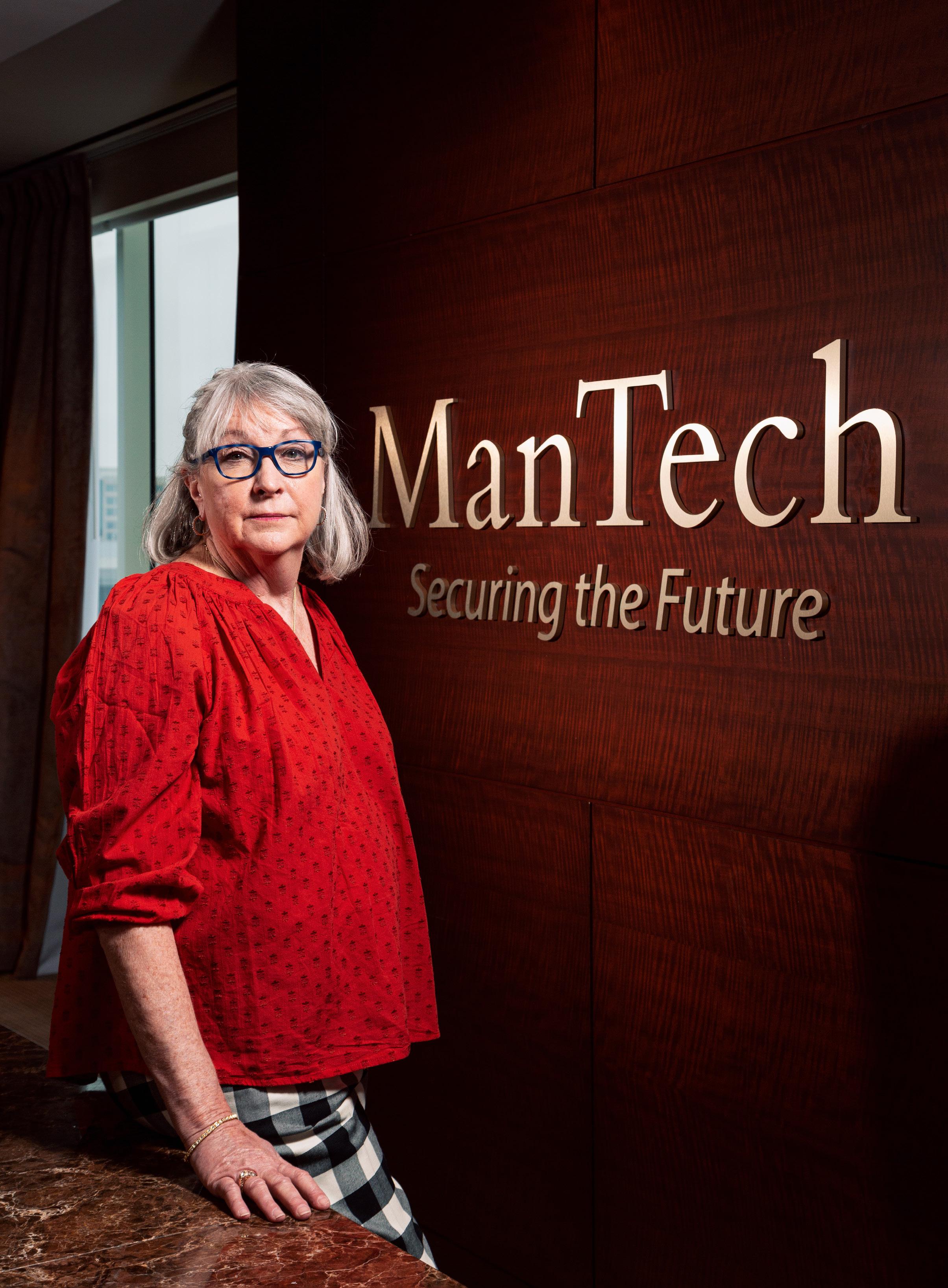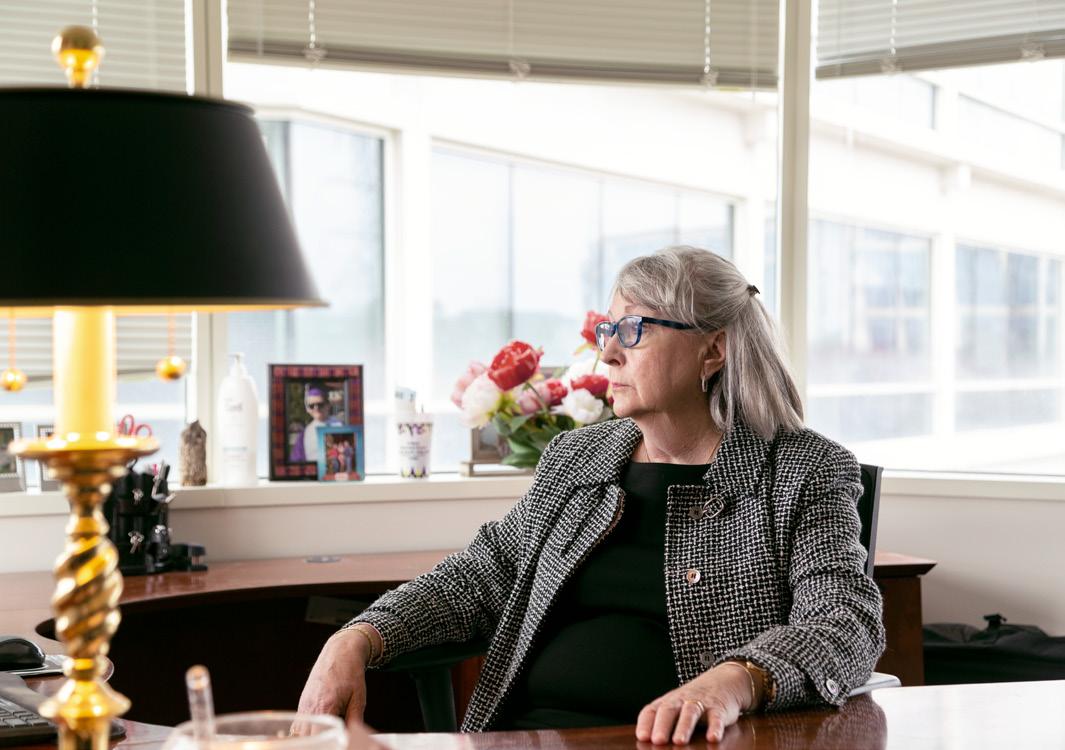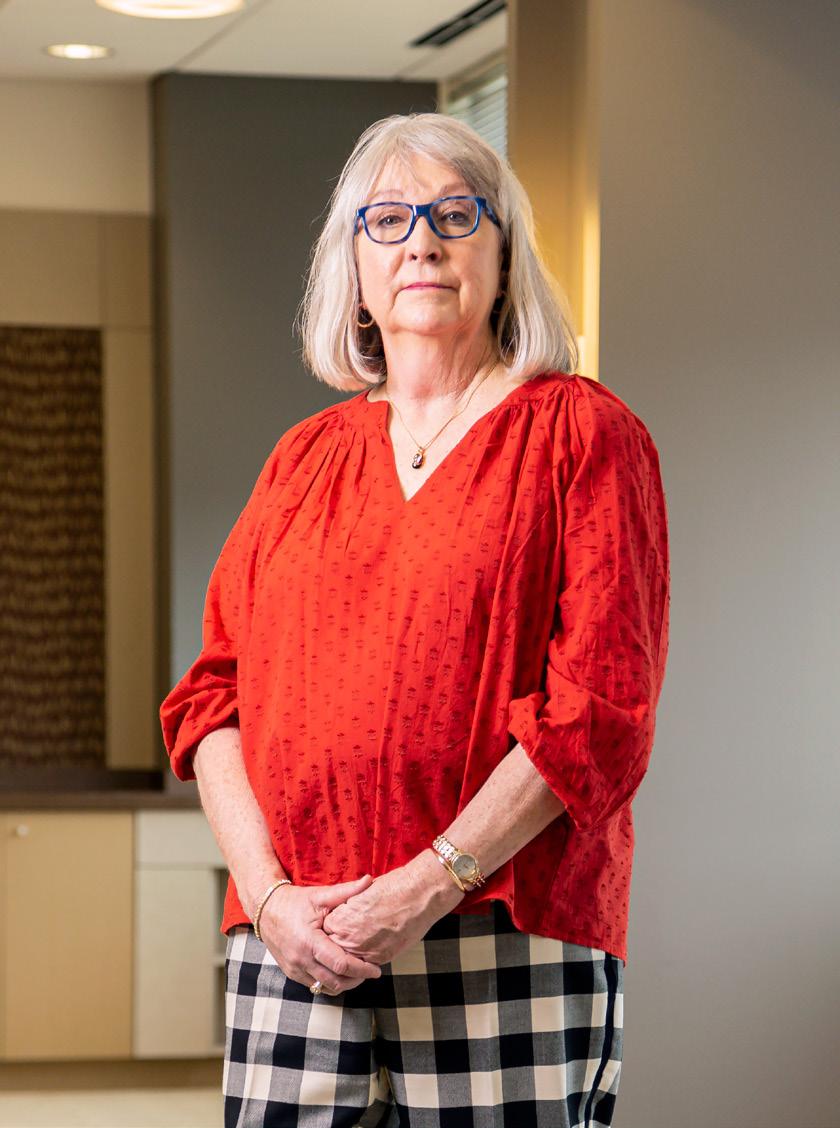
10 minute read
The Wolf of Warfare
Karen Wolf, chief learning officer at ManTech International, keeps her workforce on the cutting edge of new technologies and digital transformation.
BY ASHLEY ST. JOHN
Advertisement
The path to chief learning officer is often an unconventional one. Karen Wolf’s journey is especially compelling.
“I came to learning and development in a very odd career progression. I spent 25 years as a special agent in the FBI,” said Wolf, CLO at ManTech International. “My background was in drug-related public corruption investigations — think dirty police officers stealing drugs and selling them on the street.”
In her current role, however, she’s no longer taking down crooked cops. At ManTech, an American defense contracting firm specializing in cybersecurity and IT, Wolf is responsible for the development of more than 9,000 employees who are passionate about protecting national security. The government contractor offers services in the defense, intelligence and federal civilian markets.
“For us, learning and development is not a benefit,” Wolf said. “It’s not something we offer to our employees like dental insurance. We don’t stay in business without our employees being on the cutting edge of new technologies and digital transformation, because that’s the services that we provide to the government — whatever the latest and greatest cutting-edge stuff is.”
Wolf’s position comes with its share of challenges. She heads an L&D team of only five, responsible for the development of a geographically dispersed workforce with at least 80 percent of employees working offsite. But her unique background prepared her for the role.
Becoming a Role Model
In 1982, after getting her bachelor’s degree in communications and a stint with a public relations firm, Wolf enrolled in the FBI Academy in Quantico, Virginia. She graduated in 1983 and began her career in law enforcement as a firearms instructor for the bureau.
“I had some big cases in the FBI that I was very proud of, that a ton of work went into — multiyearlong undercover investigations,” Wolf said. “I helped put a former governor in jail for corruption in Louisiana. I worked some star-stalker cases when I was in Los Angeles.”
Wolf was one of the first 100 women hired by the FBI. In her first two field offices, she was the only female agent at times. This made it difficult to find female role models, which in part prompted Wolf’s next move.
“I really wanted to get back to the FBI Academy because when I went through the academy, there were no women on the faculty,” she said. “I think it really does help for women and people of color and minorities to have someone to look up to.”
“There’s nothing that makes a law enforcement officer more uncomfortable than not being in command of a great skill set.” — Karen Wolf, chief learning officer, ManTech International
Wolf ended up back at Quantico teaching in-classroom instruction in specialized areas of FBI investigations. But once she began teaching adults, she realized she didn’t really know what she was doing.
“There’s nothing that makes a law enforcement officer more uncomfortable than not being in command of a great skill set,” she said. “So, going back to school made a ton of sense.”
At the age of 45, Wolf enrolled at the University of Virginia and earned her master’s degree in education, followed by her doctorate in educational leadership. The FBI paid for her degrees and then pushed her to move up the administrative ranks at the FBI Academy.
“They had somebody who now could wear both hats — being sworn law enforcement and also having gotten those degrees,” Wolf said.
In 2006, Wolf retired from the FBI and went to
work in the intelligence community doing instructional design and teaching as a subject matter expert. Then in 2010, a stroke of luck brought her to ManTech.
“I’d worked for Al Malinchak when he was in the FBI — he was my boss at the FBI Academy, and he retired and I took over his job,” she said. Malinchak then became CLO of ManTech. “I called him for a reference, and he said, ‘Heck, I’ve got a job open. Would you work for me again?’ He was a great boss, so that was kind of a no-brainer.”
A Unique Set of Challenges
When Malinchak left ManTech in 2011, Wolf once again took over his role, this time as CLO. Working with a small department, it’s a big job. And it comes with a lot of challenges, one being a workforce dispersed across 46 U.S. states and 40 countries.
“At least 80 percent of our employees actually work at a customer site,” Wolf explained. “So, they’re on customer systems all day long, they’re performing the customers’ mission. They’re not necessarily in ManTech email. They’re not necessarily on ManTech systems. It’s not like I’ve got a captive audience that’s easy to reach out and touch.”
Due to the nature of their work, ManTech’s workforce also has a broad skill set, and offering a wide range of training is another challenge for Wolf.
“We have some folks who are in Afghanistan, who are providing support to the warfighter and who do very specific and technical work. They keep pieces of machinery running, they deploy mobile cell phone towers. So their training needs are different from somebody who is a data wrangler on a contract for the Department of Homeland Security,” Wolf said.
Despite these challenges, Wolf said she feels fortunate to have clarity in her mission, thanks to ManTech CEO Kevin Phillips’ 2020 strategic plan. The plan outlines ManTech’s top initiative: to be an employer of choice.
“In our industry, the way you become an employer of choice is to have learning and development opportunities that are far different from our competition and from what you see typically in the industry,” Wolf said. career enablement through a partnership with Purdue Global University. The alliance stemmed from a problem that was addressed two years ago — the struggle of getting ManTech employees to pass the Certified Information Systems Security Professional training. The certification is often listed as a requirement on government contracts. It’s a difficult exam requiring people to develop a broad knowledge base across 12 areas, and ManTech’s existing weeklong bootcamp to prepare employees wasn’t cutting it.
At the time, ManTech was in conversation with a new university alliance partner called Kaplan Education, which has since become Purdue Global University. One of the things they offered was college courses that tracked to the certification. And once you have the certification, you also get credit for the courses.
“We were able to start putting employees through those cohorts to get the certifications [through] a much longer treatment of the material, much more academic, lots more practice,” Wolf said. “And we realized that people were passing the exam at a better rate.”
From that partnership, they then started talking about degrees that would suit the ManTech workforce. Purdue Global offered two degrees that were very popular among employees: a bachelor’s and a master’s in IT, and a bachelor’s and a master’s in cybersecurity. Wolf also identified a need for a degree in cloud computing and solutions, so their subject matter experts teamed with the academic faculty at Purdue Global to jointly develop that degree. In 2019, they also developed a degree in data analytics.
According to Wolf, employees love the program. They recently had a graduation and cake ceremony for their first 18 graduates.
“Sixteen of them have master’s degrees, and two actually did their bachelor’s degree in about a year and a half. One of the reasons they could do a four-year bachelor’s degree in such a short period of time is many of them

Solutions That Stand Out
One of the ways ManTech is setting itself apart is by pivoting from a culture of performance appraisal to one of career enablement, moving away from numeric ratings into a system of quarterly check-in conversations between managers and employees.
They are also moving the needle on
had those certifications, and with those certifications comes the articulated credit for those classes,” she said.
Currently, almost 5 percent of their workforce is involved in taking college degrees, with the goal of increasing that number to 10 percent in 2020.
Stephanie Flory, ManTech’s workforce development and technical training manager, attests to the program’s success.
“I used to run our career mobility program, and when we built our partnership with Purdue Global, that was a direct linkage to our folks who were seeking new opportunities in the company,” Flory said. “And that just blew up. It got so big and we had so much interest that I started doing more and more with ManTech U and ended up leaving my role to work full time under Karen.”
Another partnership, with Skillsoft, has been very positive. According to Wolf, Skillsoft offers training that appeals to a broad variety of job families and types of work that ManTech does. They also launched a program in 2019 called Aspire Journey, which consists of pre-curated content that is sequenced in beginning, intermediate and expert, with users acquiring badges and doing assessments along the way.
“It’s been wildly popular with our employees because many of those Aspire Journeys mirror the developing skill sets that we need to support digital transformation,” Wolf said. “They have an Aspire Journey on machine learning, on artificial intelligence, on becoming a Pythonista. Those are the types of skill sets that our employees are interested in.”
The partnership also has allowed ManTech to democratize training across the company, Wolf said. In the past, profit or overhead dollars on a contract were used to fund any necessary training. But they didn’t always have that overhead, so it was uneven in terms of who in the company got the training. Now the costs are not allocated back to the contractor — they’re held at the corporate level — so anybody can take anything that they’re interested in, even if it’s not related to their contract.
“It’s changed how people view learning and development,” Wolf said. “It’s put it in the hands of our employees, so they can take ownership of their career. And our use rate and our adoption rate is through the roof — we’re well into a 60 percent user rate.”
Wolf was initially surprised to learn that use is highest on Saturday mornings.
“It’s people who probably have kids running around at soccer practice, and they’re taking a course on their mobile device,” she said. “They’re doing it on their own time, which tells me that they really value the content.”
Helping People Be Their Best
Among her colleagues, Wolf is respected as a strong and direct leader. And she’s got her own unique leadership style.
Wolf has put learning into the hands of ManTech employees.

“She’s very direct, very clear, and there’s no guesswork with her, which is refreshing for me,” Flory said. “She’s one of the most communicative bosses I’ve ever had.”
She also believes heavily in servant leadership, Flory said: “She will take out the trash, … fix a projector in one of the classrooms, and then go sit in a strategy session or go meet with the CEO and make magic happen.”
Jeff Brody, ManTech’s CHRO, is impressed with the way Wolf ties her efforts back to the success of the business: “She is the consummate lightning rod for why development is important, and not just for the sake of developing, but really translating that into business outcomes.”
There are exciting developments on the horizon for Wolf. Her team is currently working on an advanced cybertraining program to develop a specific set of skills for people in cybercommand. And they have partnered with a magnet school in Loudoun County, Virginia, to bring on interns to perform work for customers in the intelligence community through interim clearances, an initiative that Wolf said positions ManTech as an employer of choice for those entering the workforce.
It’s not just her enthusiasm that allows Wolf to be effective in her role.
“She has this incredible background,” Flory said. “It gives her breadth and depth in the field of learning and development.”
Wolf’s career may have been somewhat unconventional, but it has allowed her to see different sides to people and situations, something she said drives her.
“I spent a career in law enforcement, where a lot of times I saw people at their worst,” Wolf said. “This is different for me and it gets me out of bed because I get to see people doing their best.” CLO



